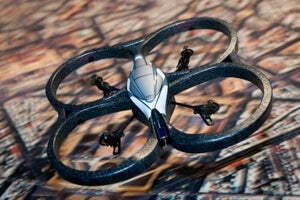Remember when Jeff Bezos said Amazon would deliver packages using drones at some point in the next few years? Bezos and Amazon may be beat to the punch by a government in the Middle East. The United Arab Emirates (UAE) recently launched a million dollar contest to develop and implement a fleet of delivery drones within a year.
Competitors will design drones to deliver government documents. The drone’s cargo compartment would be secured biometrically—requiring a finger print or retina scan to release the paperwork inside. The UAE plans to announce a winner in May, and after six months of testing in the dust and heat, begin regular service.
In the beginning, the drones would deliver documents, but the government says they’re open to additional uses including traffic monitoring and geographic surveys.
Declining costs and growing capabilities have led a number of organizations to suggest non-military uses for drones. Amazon CEO, Jeff Bezos, caused a stir last year when he told 60 Minutes his firm was looking into a drone delivery network for Amazon customers. Called Prime Air, Amazon’s drones would fulfill orders inside 30 minutes.
We also wrote about Matternet last year. The firm aims to set up fully automated drone networks to deliver medicine and other supplies to rural communities in developing countries where road infrastructure is sketchy. But both Amazon and Matternet believe implementation of drone delivery is still a few years off. So is the UAE’s timeline realistic? Bezos’ own Washington Post is skeptical, but we’d argue it’s plausible.

It appears UAE’s drones will be monitored and operated by human pilots. A piloted fleet of delivery drones would be simpler than a partially or fully automated drone network, like those proposed by Matternet and Amazon.
Further, instead of awaiting government agencies to hash out new rules, the project already has the blessing of the UAE government. Finally, although the winning design will need to handle dust and heat, the payload shouldn’t be a problem. Drones can carry a few kilograms up to 10 kilometers. Government documents are light and, therefore, well suited to the technology as it currently exists.
In conversations with Matternet, it was clear that, although technical hurdles exist, broadly speaking, the technology is already here—the challenge is improving a negative public image and kickstarting the regulatory apparatus, especially in the US.
The US Federal Aviation Administration (FAA) is rewriting the rules of the sky to include robots, and the agency is set to release proposed commercial drone regulations for public comment later this year. However, nothing will likely be finalized until next year.
In the meantime, the FAA is keeping a tight grip on the technology. The agency shut down Lakemead brewery’s beer delivery drones to ice fishermen in Minnesota (see their video below), and an FAA spokesman told Singularity Hub that, to avoid running afoul of currently hazy regulations, Amazon’s Prime Air video was shot outside the US.
In other countries, like the Dominican Republic, where Matternet is testing their technology, the startup has found drones are more readily accepted.
Matternet co-founder and head of regulatory strategy, Paola Santana, told us, “The people who most understand this technology are the people who most need it.” Though Santana also acknowledged it’s useful to outline what you can and can’t do with drones.
As the US government deliberates, perhaps experiments in other countries, like the proposed UAE drone delivery service, will demonstrate the viability of the technology.
Image Credit: Simon Jardine/Flickr; TBWABusted/Flickr



